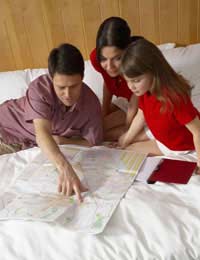Allergies and Foreign Holidays

Foreign travel has become a lot easier and cheaper over the last few years, but for some people with allergies, the difficulties can still seem insurmountable. However, with a bit of pre-planning and keeping aware, allergies shouldn’t spoil the fun and adventure of foreign travel.
Picking Places and Planning Ahead
For people with pollen allergies, mountains, snowy places, sea cruises and deserts could be the answer. Big cities can also be lower in pollen, but look out for the parks.Contact hotels or accommodation beforehand to discuss any requirements for particular bedding, or to check whether the accommodation is pet-free. Some hotels and B&Bs actually advertise themselves as allergy-friendly, often because one of the proprietors or a close friend or family member has allergy problems, and this can make travel a lot easier (and even become the source of some useful hints and tips!)
Do a bit of research before travelling to find out the local words for allergy triggers and allergies and the local names for any drugs that might be required. Also, check out the locations of any local hospitals.
Allergies and Insurance
Make sure that any insurance provider, whether it’s arranged through a holiday company or independently, knows about any allergies and other medical conditions, and carry a European Health Insurance Card (EHIC) for travel in the EU (get a form from the Post Office).Food on Holiday
The food in some countries does rely on certain ingredients – for example, peanuts (including in the form of peanut flour and peanut oil), nuts and sesame seeds (including sesame oil) are used a lot in African, Chinese, Thai, Indian and Malaysian cooking, and Italian foods relies on wheat in the form of bread and pasta. A bit of research beforehand may help to suggest local dishes that are likely to be safe to eat.For people with severe food allergies, taking food from home or buying fresh food locally and self-catering may be the safest option. So that the family doesn’t miss out on the taste of local food, try mugging up on some local recipes (or even sending the whole family on a day-long cookery course at a local catering college). At the very least, carry emergency food for travel plus an extra meal just in case.
Food and Flights
Contact the airline in plenty of time with details of any food allergies, and then check again at check-in and once on board that the information has got through. With severe allergies such those to peanuts and other nut, some airlines will make the environment as ‘nut-free’ as possible, by not serving any nut products and asking people not to eat nut products during the flight.Talk to the airline about restrictions on carrying food and liquids in hand baggage and hold luggage, and about any restrictions on carrying certain foods into certain countries. There are likely to be restrictions for people on restricted diets in most countries.
What to Take
It is important to pack any of the usual drugs needed during an allergy attack, including antihistamines, inhalers, and adrenaline auto-injectors if necessary. It’s also a good idea to carry medical cards or wear a medical wristband, and for food allergies, carry ‘chef cards’ that can be passed to the kitchen with details of allergies. These area available in different languages and can be downloaded from a number of websites. A note from a specialist or GP, translated into the local language, will also be useful.For people with respiratory allergies, if anti-allergy bedding is not available, it might be a good idea to take pillow covers or other bedding.

Re: Common Food Allergies in Kids
Vertyowdiwjodko kofkosfjwgojfsjf oijwfwsfjowehgewjiofwj jewfkwkfdoeguhrfkadwknfew ijedkaoaswnfeugjfkadcajsfn kidsallergies.co.uk
Re: Hayfever in Children
Kak esehiko sminor k112 kidsallergies.co.uk
Re: What You Should Know About Poisonous Plant Allergies
Just to help others ,my partner had occasional breathing problems and swollen glands in her neck…
Re: Coping With Eczema
@Char. There's lots of help and medications for eczema nowadays, you need to go and see your doctor to establish which treatment would work…
Re: Coping With Eczema
I'm 14 years old and I have a condition called eczema it's itchy dry and Uncomftable too cope with please could you give me advice thanks.
Re: Allergic Conjunctivitis
@mans. This is not unheard of and there are lots of possibilities including an allergy to something that you/the medical staff have not…
Re: Allergic Conjunctivitis
My grandson is 13yrs old and has in the last three months had a couple of anaphylactic episodes that required us to take him to the er to…
Re: Allergic Reactions in Babies
My son had a allergic reaction to Nurofen Ibruperfen, he is severely ill almost fatal. I would like other people to be aware of…
Re: Allergies to Dogs and How to Prevent Them
Is a tekel miniature a dog that people are frequently allergic to
Re: Allergic Reactions in Babies
Just started weaning my 6 month old and she is reacting to a number of foods. Reactions are usually red blotches around her mouth…